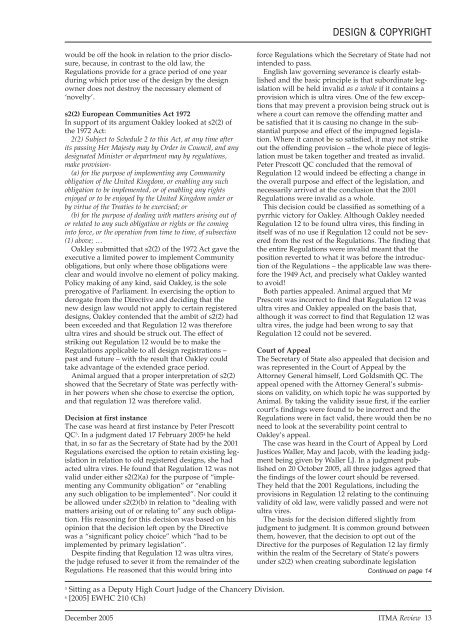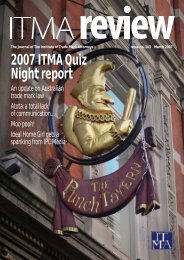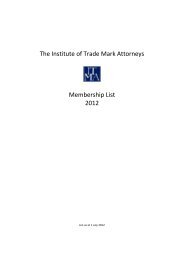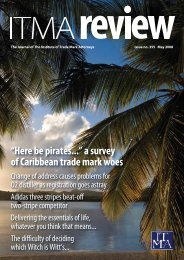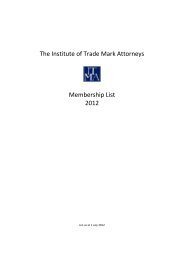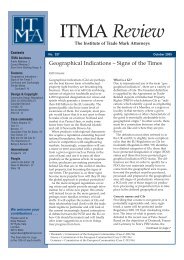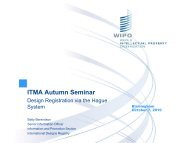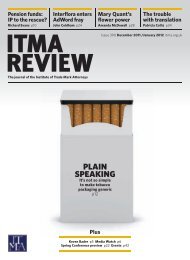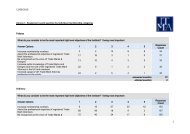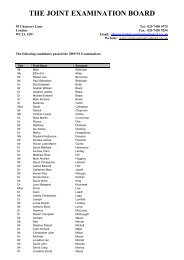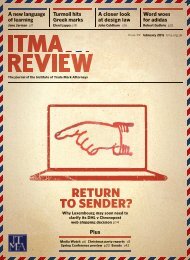ITMA 322 APRIL 2005
ITMA 322 APRIL 2005
ITMA 322 APRIL 2005
Create successful ePaper yourself
Turn your PDF publications into a flip-book with our unique Google optimized e-Paper software.
would be off the hook in relation to the prior disclosure,<br />
because, in contrast to the old law, the<br />
Regulations provide for a grace period of one year<br />
during which prior use of the design by the design<br />
owner does not destroy the necessary element of<br />
‘novelty’.<br />
s2(2) European Communities Act 1972<br />
In support of its argument Oakley looked at s2(2) of<br />
the 1972 Act:<br />
2(2) Subject to Schedule 2 to this Act, at any time after<br />
its passing Her Majesty may by Order in Council, and any<br />
designated Minister or department may by regulations,<br />
make provision-<br />
(a) for the purpose of implementing any Community<br />
obligation of the United Kingdom, or enabling any such<br />
obligation to be implemented, or of enabling any rights<br />
enjoyed or to be enjoyed by the United Kingdom under or<br />
by virtue of the Treaties to be exercised; or<br />
(b) for the purpose of dealing with matters arising out of<br />
or related to any such obligation or rights or the coming<br />
into force, or the operation from time to time, of subsection<br />
(1) above; …<br />
Oakley submitted that s2(2) of the 1972 Act gave the<br />
executive a limited power to implement Community<br />
obligations, but only where those obligations were<br />
clear and would involve no element of policy making.<br />
Policy making of any kind, said Oakley, is the sole<br />
prerogative of Parliament. In exercising the option to<br />
derogate from the Directive and deciding that the<br />
new design law would not apply to certain registered<br />
designs, Oakley contended that the ambit of s2(2) had<br />
been exceeded and that Regulation 12 was therefore<br />
ultra vires and should be struck out. The effect of<br />
striking out Regulation 12 would be to make the<br />
Regulations applicable to all design registrations –<br />
past and future – with the result that Oakley could<br />
take advantage of the extended grace period.<br />
Animal argued that a proper interpretation of s2(2)<br />
showed that the Secretary of State was perfectly within<br />
her powers when she chose to exercise the option,<br />
and that regulation 12 was therefore valid.<br />
Decision at first instance<br />
The case was heard at first instance by Peter Prescott<br />
QC 3 . In a judgment dated 17 February <strong>2005</strong> 4 he held<br />
that, in so far as the Secretary of State had by the 2001<br />
Regulations exercised the option to retain existing legislation<br />
in relation to old registered designs, she had<br />
acted ultra vires. He found that Regulation 12 was not<br />
valid under either s2(2)(a) for the purpose of “implementing<br />
any Community obligation” or “enabling<br />
any such obligation to be implemented”. Nor could it<br />
be allowed under s2(2)(b) in relation to “dealing with<br />
matters arising out of or relating to” any such obligation.<br />
His reasoning for this decision was based on his<br />
opinion that the decision left open by the Directive<br />
was a “significant policy choice” which “had to be<br />
implemented by primary legislation”.<br />
Despite finding that Regulation 12 was ultra vires,<br />
the judge refused to sever it from the remainder of the<br />
Regulations. He reasoned that this would bring into<br />
3 Sitting as a Deputy High Court Judge of the Chancery Division.<br />
4 [<strong>2005</strong>] EWHC 210 (Ch)<br />
DESIGN & COPYRIGHT<br />
force Regulations which the Secretary of State had not<br />
intended to pass.<br />
English law governing severance is clearly established<br />
and the basic principle is that subordinate legislation<br />
will be held invalid as a whole if it contains a<br />
provision which is ultra vires. One of the few exceptions<br />
that may prevent a provision being struck out is<br />
where a court can remove the offending matter and<br />
be satisfied that it is causing no change in the substantial<br />
purpose and effect of the impugned legislation.<br />
Where it cannot be so satisfied, it may not strike<br />
out the offending provision – the whole piece of legislation<br />
must be taken together and treated as invalid.<br />
Peter Prescott QC concluded that the removal of<br />
Regulation 12 would indeed be effecting a change in<br />
the overall purpose and effect of the legislation, and<br />
necessarily arrived at the conclusion that the 2001<br />
Regulations were invalid as a whole.<br />
This decision could be classified as something of a<br />
pyrrhic victory for Oakley. Although Oakley needed<br />
Regulation 12 to be found ultra vires, this finding in<br />
itself was of no use if Regulation 12 could not be severed<br />
from the rest of the Regulations. The finding that<br />
the entire Regulations were invalid meant that the<br />
position reverted to what it was before the introduction<br />
of the Regulations – the applicable law was therefore<br />
the 1949 Act, and precisely what Oakley wanted<br />
to avoid!<br />
Both parties appealed. Animal argued that Mr<br />
Prescott was incorrect to find that Regulation 12 was<br />
ultra vires and Oakley appealed on the basis that,<br />
although it was correct to find that Regulation 12 was<br />
ultra vires, the judge had been wrong to say that<br />
Regulation 12 could not be severed.<br />
Court of Appeal<br />
The Secretary of State also appealed that decision and<br />
was represented in the Court of Appeal by the<br />
Attorney General himself, Lord Goldsmith QC. The<br />
appeal opened with the Attorney General’s submissions<br />
on validity, on which topic he was supported by<br />
Animal. By taking the validity issue first, if the earlier<br />
court’s findings were found to be incorrect and the<br />
Regulations were in fact valid, there would then be no<br />
need to look at the severability point central to<br />
Oakley’s appeal.<br />
The case was heard in the Court of Appeal by Lord<br />
Justices Waller, May and Jacob, with the leading judgment<br />
being given by Waller LJ. In a judgment published<br />
on 20 October <strong>2005</strong>, all three judges agreed that<br />
the findings of the lower court should be reversed.<br />
They held that the 2001 Regulations, including the<br />
provisions in Regulation 12 relating to the continuing<br />
validity of old law, were validly passed and were not<br />
ultra vires.<br />
The basis for the decision differed slightly from<br />
judgment to judgment. It is common ground between<br />
them, however, that the decision to opt out of the<br />
Directive for the purposes of Regulation 12 lay firmly<br />
within the realm of the Secretary of State’s powers<br />
under s2(2) when creating subordinate legislation<br />
Continued on page 14<br />
December <strong>2005</strong> <strong>ITMA</strong> Review 13


